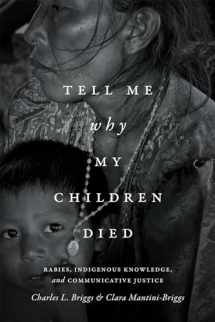
Tell Me Why My Children Died: Rabies, Indigenous Knowledge, and Communicative Justice (Critical Global Health: Evidence, Efficacy, Ethnography)
ISBN-13:
9780822361053
ISBN-10:
0822361051
Edition:
Illustrated
Author:
Charles L. Briggs, Clara Mantini-Briggs
Publication date:
2016
Publisher:
Duke University Press Books
Format:
Hardcover
344 pages
FREE US shipping
Book details
ISBN-13:
9780822361053
ISBN-10:
0822361051
Edition:
Illustrated
Author:
Charles L. Briggs, Clara Mantini-Briggs
Publication date:
2016
Publisher:
Duke University Press Books
Format:
Hardcover
344 pages
Summary
Tell Me Why My Children Died: Rabies, Indigenous Knowledge, and Communicative Justice (Critical Global Health: Evidence, Efficacy, Ethnography) (ISBN-13: 9780822361053 and ISBN-10: 0822361051), written by authors
Charles L. Briggs, Clara Mantini-Briggs, was published by Duke University Press Books in 2016.
With an overall rating of 4.3 stars, it's a notable title among other
books. You can easily purchase or rent Tell Me Why My Children Died: Rabies, Indigenous Knowledge, and Communicative Justice (Critical Global Health: Evidence, Efficacy, Ethnography) (Hardcover) from BooksRun,
along with many other new and used
books
and textbooks.
And, if you're looking to sell your copy, our current buyback offer is $0.3.
Description
Tell Me Why My Children Died tells the gripping story of indigenous leaders' efforts to identify a strange disease that killed thirty-two children and six young adults in a Venezuelan rain forest between 2007 and 2008. In this pathbreaking book, Charles L. Briggs and Clara Mantini-Briggs relay the nightmarish and difficult experiences of doctors, patients, parents, local leaders, healers, and epidemiologists; detail how journalists first created a smoke screen, then projected the epidemic worldwide; discuss the Chávez government's hesitant and sometimes ambivalent reactions; and narrate the eventual diagnosis of bat-transmitted rabies. The book provides a new framework for analyzing how the uneven distribution of rights to produce and circulate knowledge about health are wedded at the hip with health inequities. By recounting residents' quest to learn why their children died and documenting their creative approaches to democratizing health, the authors open up new ways to address some of global health's most intractable problems.


We would LOVE it if you could help us and other readers by reviewing the book
Book review

Congratulations! We have received your book review.
{user}
{createdAt}
by {truncated_author}


